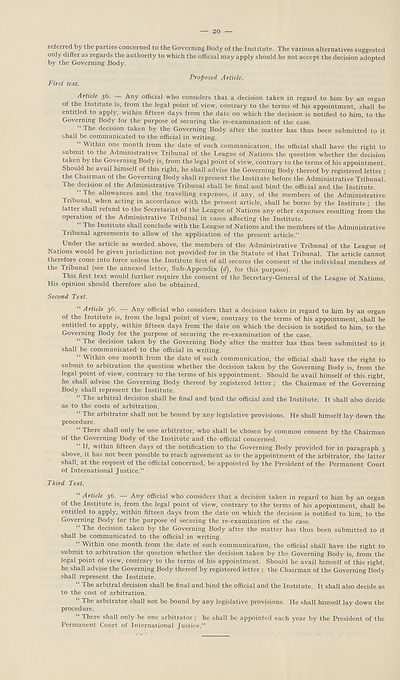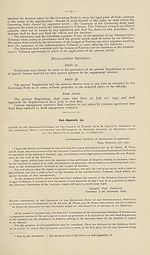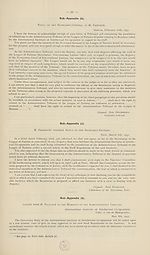International > Report of the Governing body of the International Institute of Intellectual Co-operation > 1931
(20)
Download files
Complete book:
Individual page:
Thumbnail gallery: Grid view | List view

20
lefcrred by the parties concerned to the Governing Body of the Institute. The various alternatives suggested
only differ as regards the authority to which the official may apply should he not accept the decision adopted
by the Governing Body.
Proposed Article.
First text.
Article 36. Any official who considers that a decision taken in regard to him by an organ
of the Institute is, from the legal point of view, contrary to the terms of his appointment, shall be
entitled to apply, within fifteen days from the date on which the decision is notified to him, to the
Governing Body for the purpose of securing the re-examination of the case.
The decision taken by the Governing Body after the matter has thus been submitted to it
shall be communicated to the official in writing.
“ Within one month from the date of such communication, the official shall have the right to
submit to the Administrative Tribunal of the League of Nations the question whether the decision
taken by the Governing Body is, from the legal point of view, contrary to the terms of his appointment.
Should he avail himself of this right, he shall advise the Governing Body thereof by registered letter ;
the Chairman of the Governing Body shall represent the Institute before the Administrative Tribunal.
The decision of the Administrative Tribunal shall be final and bind the official and the Institute.
1 he allowances and the travelling expenses, if any, of the members of the Administrative
Tribunal, when acting in accordance with the present article, shall be borne by the Institute ; the
latter shall refund to the Secretariat of the League of Nations any other expenses resulting from the
operation of the Administrative Tribunal in cases affecting the Institute.
The Institute shall conclude with the League of Nations and the members of the Administrative
Tribunal agreements to allow of the application of the present article.”
Under the article as worded above, the members of the Administrative Tribunal of the League of
Nations would be given jurisdiction not provided for in the Statute of that Tribunal. The article cannot
therefore come into force unless the Institute first of all secures the consent of the individual members of
the Tribunal (see the annexed letter, Sub-Appendix [d), for this purpose).
This first text would further require the consent of the Secretary-General of the League of Nations.
His opinion should therefore also be obtained.
Second Text.
Article 36. Any official who considers that a decision taken in regard to him by an organ
of the Institute is, from the legal point of view, contrary to the terms of his appointment, shall be
entitled to apply, within fifteen days from the date on which the decision is notified to him, to the
Governing Body for the purpose of securing the re-examination of the case.
“ The decision taken by the Governing Body after the matter has thus been submitted to it
shall be communicated to the official in writing.
“ Within one month from the date of such communication, the official shall have the right to
submit to arbitration the question whether the decision taken by the Governing Body is, from the
legal point of view, contrary to the terms of his appointment. Should he avail himself of this right,
he shall advise the Governing Body thereof by registered letter ; the Chairman of the Governing
Body shall represent the Institute.
“ The arbitral decision shall be final and bind the official and the Institute. It shall also decide
as to the costs of arbitration.
The arbitrator shall not be bound by any legislative provisions. He shall himself lay down the
procedure.
There shall only be one arbitrator, who shall be chosen by common consent by the Chairman
of the Governing Body of the Institute and the official concerned.
If, within fifteen days of the notification to the Governing Body provided for in paragraph 3
above, it has not been possible to reach agreement as to the appointment of the arbitrator, the latter
shall, at the request of the official concerned, be appointed by the President of the Permanent Court
of International Justice.”
Third Text.
Article 36. Any official who considers that a decision taken in regard to him by an organ
of the Institute is, from the legal point of view, contrary to the terms of his apopintment, shall be
entitled to apply, within fifteen days from the date on which the decision is notified to him, to the
Governing Body for the purpose of securing the re-examination of the case.
“ The decision taken by the Governing Body after the matter has thus been submitted to it
shall be communicated to the official in writing.
“ Within one month from the date of such communication, the official shall have the right to
submit to arbitration the question whether the decision taken by the Governing Body is, from the
legal point of view, contrary to the terms of his appointment. Should he avail himself of this right,
he shall advise the Governing Body thereof by registered letter : the Chairman of the Governing Body
shall represent the Institute.
“ The arbitral decision shall be final and bind the official and the Institute. It shall also decide as
to the cost of arbitration.
“ The arbitrator shall not be bound by any legislative provisions. He shall himself lay down the
procedure.
“ There shall only be one arbitrator ; he shall be appointed each year by the President of the
Permanent Court of International Justice.”
lefcrred by the parties concerned to the Governing Body of the Institute. The various alternatives suggested
only differ as regards the authority to which the official may apply should he not accept the decision adopted
by the Governing Body.
Proposed Article.
First text.
Article 36. Any official who considers that a decision taken in regard to him by an organ
of the Institute is, from the legal point of view, contrary to the terms of his appointment, shall be
entitled to apply, within fifteen days from the date on which the decision is notified to him, to the
Governing Body for the purpose of securing the re-examination of the case.
The decision taken by the Governing Body after the matter has thus been submitted to it
shall be communicated to the official in writing.
“ Within one month from the date of such communication, the official shall have the right to
submit to the Administrative Tribunal of the League of Nations the question whether the decision
taken by the Governing Body is, from the legal point of view, contrary to the terms of his appointment.
Should he avail himself of this right, he shall advise the Governing Body thereof by registered letter ;
the Chairman of the Governing Body shall represent the Institute before the Administrative Tribunal.
The decision of the Administrative Tribunal shall be final and bind the official and the Institute.
1 he allowances and the travelling expenses, if any, of the members of the Administrative
Tribunal, when acting in accordance with the present article, shall be borne by the Institute ; the
latter shall refund to the Secretariat of the League of Nations any other expenses resulting from the
operation of the Administrative Tribunal in cases affecting the Institute.
The Institute shall conclude with the League of Nations and the members of the Administrative
Tribunal agreements to allow of the application of the present article.”
Under the article as worded above, the members of the Administrative Tribunal of the League of
Nations would be given jurisdiction not provided for in the Statute of that Tribunal. The article cannot
therefore come into force unless the Institute first of all secures the consent of the individual members of
the Tribunal (see the annexed letter, Sub-Appendix [d), for this purpose).
This first text would further require the consent of the Secretary-General of the League of Nations.
His opinion should therefore also be obtained.
Second Text.
Article 36. Any official who considers that a decision taken in regard to him by an organ
of the Institute is, from the legal point of view, contrary to the terms of his appointment, shall be
entitled to apply, within fifteen days from the date on which the decision is notified to him, to the
Governing Body for the purpose of securing the re-examination of the case.
“ The decision taken by the Governing Body after the matter has thus been submitted to it
shall be communicated to the official in writing.
“ Within one month from the date of such communication, the official shall have the right to
submit to arbitration the question whether the decision taken by the Governing Body is, from the
legal point of view, contrary to the terms of his appointment. Should he avail himself of this right,
he shall advise the Governing Body thereof by registered letter ; the Chairman of the Governing
Body shall represent the Institute.
“ The arbitral decision shall be final and bind the official and the Institute. It shall also decide
as to the costs of arbitration.
The arbitrator shall not be bound by any legislative provisions. He shall himself lay down the
procedure.
There shall only be one arbitrator, who shall be chosen by common consent by the Chairman
of the Governing Body of the Institute and the official concerned.
If, within fifteen days of the notification to the Governing Body provided for in paragraph 3
above, it has not been possible to reach agreement as to the appointment of the arbitrator, the latter
shall, at the request of the official concerned, be appointed by the President of the Permanent Court
of International Justice.”
Third Text.
Article 36. Any official who considers that a decision taken in regard to him by an organ
of the Institute is, from the legal point of view, contrary to the terms of his apopintment, shall be
entitled to apply, within fifteen days from the date on which the decision is notified to him, to the
Governing Body for the purpose of securing the re-examination of the case.
“ The decision taken by the Governing Body after the matter has thus been submitted to it
shall be communicated to the official in writing.
“ Within one month from the date of such communication, the official shall have the right to
submit to arbitration the question whether the decision taken by the Governing Body is, from the
legal point of view, contrary to the terms of his appointment. Should he avail himself of this right,
he shall advise the Governing Body thereof by registered letter : the Chairman of the Governing Body
shall represent the Institute.
“ The arbitral decision shall be final and bind the official and the Institute. It shall also decide as
to the cost of arbitration.
“ The arbitrator shall not be bound by any legislative provisions. He shall himself lay down the
procedure.
“ There shall only be one arbitrator ; he shall be appointed each year by the President of the
Permanent Court of International Justice.”
Set display mode to:
![]() Universal Viewer |
Universal Viewer | ![]() Mirador |
Large image | Transcription
Mirador |
Large image | Transcription
Images and transcriptions on this page, including medium image downloads, may be used under the Creative Commons Attribution 4.0 International Licence unless otherwise stated. ![]()
| League of Nations > International > Report of the Governing body of the International Institute of Intellectual Co-operation > 1931 > (20) |
|---|
| Permanent URL | https://digital.nls.uk/195306604 |
|---|
| Attribution and copyright: |
|
|---|---|
| Shelfmark | LN.XII.3 |
|---|---|
| Shelfmark | LN.XII |
|---|
| Description | Over 1,200 documents from the non-political organs of the League of Nations that dealt with health, disarmament, economic and financial matters for the duration of the League (1919-1945). Also online are statistical bulletins, essential facts, and an overview of the League by the first Secretary General, Sir Eric Drummond. These items are part of the Official Publications collection at the National Library of Scotland. |
|---|---|
| Additional NLS resources: |
|

